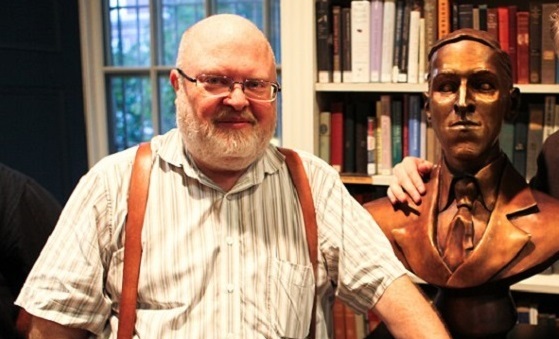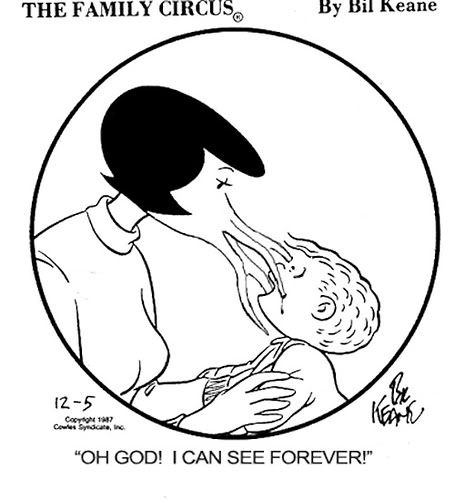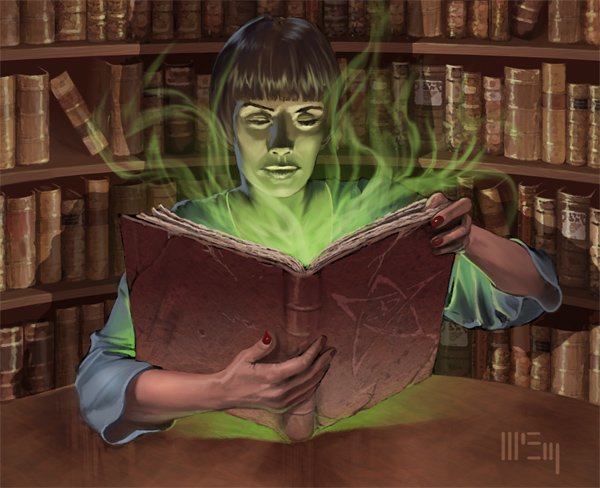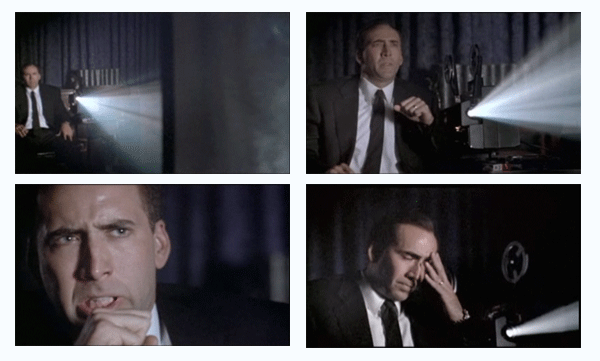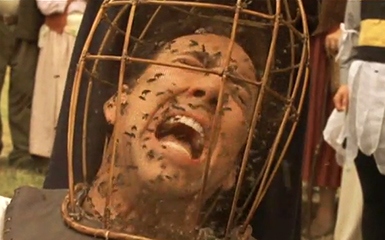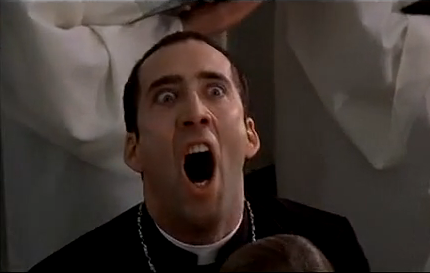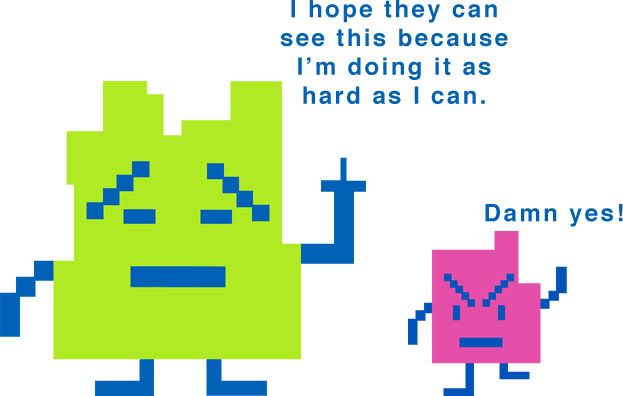Reference
The Cthulhu Mythos
For now, you can listen to Slovakian Lovecraft-inspired black metal band
Azathoth.
 The “Reference” chapter is the longest in the book, and also in no particular order.
The “Reference” chapter is the longest in the book, and also in no particular order.
FrankT:
Clocking in at 124 pages, the Reference chapter is nearly half the book all by itself. Parts of it are in character, parts out of character. It includes some rules and systems (that
possibly should have been included with the chapter nominally about that), some discussions of canon and fanon, and some other stuff. It doesn't hold together even in concept as a chapter. Organization of this book is a fucking mess. You'd
think that the spellcasting rules would be in the “Magic” section of the “Rules” chapter while the lists of rare book names used in source fiction would be in the “References,” and you'd be wrong about that. That sensible organization scheme is literally the opposite of what is delivered.
There are a lot of ways to organize an RPG book. Ultimately, it's a reference book for a game, so putting information where the users expect it to be is more important than putting things in an order that makes sense on first reading. But the organizational scheme of this book is just fucking
wrong. It's not that there are a few things that are in a puzzling location or some related concepts are repeated or split up unnecessarily, it's that fucking
everything is an organizational clusterfuck. It's like every rule and piece of fluff text was simply written down in the order the author thought of it and you're reading it in first-in-first-out format. It really feels like you're flipping through some guy's circa 1986 three-ring-binder of Call of Cthulhu essays rather than a published product.
 People used to put their gaming notes into these things.
People used to put their gaming notes into these things.
Anyway, the Reference chapter begins with a five page section on the Cthulhu Mythos, which attempts to create a unified timeline and hierarchy of gods and aliens. This is nowhere near enough space to mindcaulk all this shit together. Not only do we have multiple authors writing, but not all of the books were originally intended to play nicely together in the first place. Plus, some of the source material is urban fantasy while other material is science fiction horror. So while the Fungi From Yuggoth are pulling all their “supernatural” stunts with science fictionish goodness, the Lamia are just sorcerous negresses. Reconciling those two branches of Lovecraftian horror would probably be a lot of work, which might be why this book doesn't bother trying.
 Many monsters from the Mythos are better in written form, where their incompatible traits form nightmarish images in your mind than they are drawn on paper, where they just of look clumsy and hodge podge.
Many monsters from the Mythos are better in written form, where their incompatible traits form nightmarish images in your mind than they are drawn on paper, where they just of look clumsy and hodge podge.
AncientH:
Here's the thing about the Cthulhu Mythos: the
great appeal of the stories are the little connections and interactions that build up between different pieces, slowly revealing more and more of the universe. It's not that people didn't understand the idea of authors with distinct settings back in the 20s and 30s - fuck, Baum had Oz, and Burroughs had Tarzan and Pellucidar and Mars - but if you used Pellucidar in one of your stories then Burroughs would sue you, while in
Weird Tales you'd have two or three different authors whose stories might include mentions of Cthulhu, Tsathoggua, or the
Necronomicon. It got to the point that readers actively thought that this was some common if obscure set of myths and that the
Necronomicon really existed, because the idea that authors would
share their creations was just not on the fucking map yet.
And fans being fans...well, we like tracing down connections and pride ourselves on obscure lore. True of comic books, true of religion, pretty much everything. It's right up there with writing fanfic...which, of course, is what happened next. But you have to remember that this was before the internet, back when business was still largely done by mail, and missing one issue of
Weird Tales meant you'd never see the contents of that issue ever. So fans talked seriously about timelines and chronologies and connections, looking at how this factoid could fit in with that one, connecting up the family trees of different Mythos entities into a great, sprawling mess, which they then gleefully added to. And that's all shit that took place before
Call of Cthulhu the Roleplaying Game came out. That was before the tremendous explosion in Mythos fiction.
 This doesn't even scratch the surface.
This doesn't even scratch the surface.
And by luck, CoC was right in the middle of it - largely because of the Call of Cthulhu Fiction line, which was a (very) well received series of anthologies collecting and reprinting often-obscure works by Lovecraft and others which essentially
became the canon. That's not even touching on its tremendous influence in Japan or anything. So with this chapter, you have to remember, was never going to be exhaustive - there's just too much. There was too much in 1981, there was way too much in 1999. This was just to give people a
taste of the fan-madness, and I think if it accomplishes it then they probably figured they'd succeeded. But yeah, it's a completely random mishmash of mini-essays, trying to give some sort of shape to the whole Mythos, just so that the players and Keepers and
writers have something to work with.

I'm not even gonna try to summarize this here. There's Elder Gods, Outer Gods, Other Gods, Great Old Ones, Elder Things, the Fungi from Yuggoth, the Great Race, witch-cults, etc. The language that this game specifically introduced is
servitor race and
independent race, often given in "lesser" or "greater" varieties, which denote an alien/supernatural species which serves a particular Mythos entity or entities or...doesn't. Think of it like Romania and Switzerland in WWII, if that helps.
FrankT:
The end of the mythos summary is a rant about how the author left some stuff out. He specifically calls out some stuff that he things is super dumb, like characters being able to actually
do things or Cthulhu being associated with water. It's... a pretty weird rant actually. I understand that people have straight up made contradictory declarations about how the Cthulhu Mythos is or ought to be, but this reads like someone taking their ball and going home in diary format.
 That'll show 'em!
That'll show 'em!
The supposed reason it doesn't make sense for Cthulhu to be associated with water is that he spends his time when the stars are not right and he cannot live under the sea. I read and reread that objection several times, and it still doesn't make any sense to me.
AncientH:
It's a big kerfluffle that still rankles some feathers even though all the parties involved are dead (mostly), but I'll give you the short version. For the slightly longer version look here:
Black Seas of Copyright.
In 1937, H. P. Lovecraft died. There was some argument about his estate, and eventually one of Lovecraft's correspondents named August Derleth bullied and badgered and bargained his way into essentially controlling the literary rights to Lovecraft's stories, which Derleth then published through Arkham House and ruled with an iron fist until he died. Now, Derleth got Lovecraft's stuff published, and he kept it published, but he was an asshole doing so, and he probably never had a right to do it, so that's half the reason the fanbase doesn't like him.
The
other half of the reason the fanbase doesn't like Derleth is that he wrote a bunch of Mythos fiction - really bad Mythos fiction - a good chunk of it labelled as "collaborations" with Lovecraft, who was already dead at this point. This is where you get weird shit like where Derleth tries to categorize the Great Old Ones into the four classical elements - and yes, I realize that's completely fucking weird and doesn't seem to work. Cthulhu looks a bit like a squid and is under the sea, so Derleth assigned him as a water elemental...even though Cthulhu was technically
imprisoned under the sea, and the water was supposed to damp down his telepathy or something. You can see that this was some crazy-ass fan shit, basically grounded in some fundamental disagreements in the expanded universe which nobody had a phrase for yet. (The other side of that is that because Lovecraft never made a "fire" elemental, Derleth did - and so we have Cthugha.)
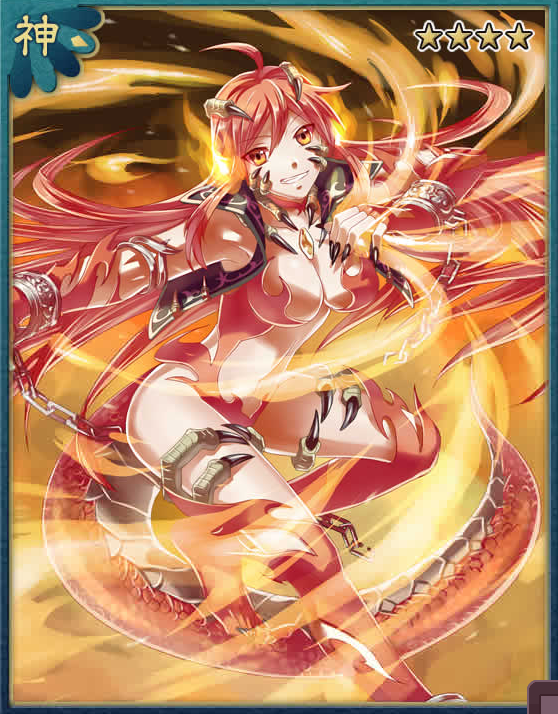 I will only explain this if you absolutely want me to.
I will only explain this if you absolutely want me to.
FrankT:
The timeline of the world has a key element that the continents moved around pretty much like they did. This is not a wild anachronism, but an important part of the mythos as understood by HP Lovecraft. He was an early adopter of continental drift theory, accepting the evidence that the continents had moved from earlier positions on the globe decades before anyone figured out tectonic plates. HP Lovecraft was as ahead of the times in geology as he was definitely not ahead of the times in anthropology. The thing is that even though that's fascinating, it doesn't really
matter. If the Nameless City was built half a billion years ago or just a hundred million years ago, that doesn't really affect the players in any way. It's all just “the before time” as far as any actions matter in the here and now. Sure it's fine for Elder Things and Shoggoths to be pissed off at each other for things that happened 250 million years ago, but
it was 250 million years ago! It honestly doesn't matter whether any of that shit actually happened or not. The stone tablets that recorded the original incident have long since crumbled to dust only to have that dust be compressed back into stone by geologic compression. You don't have a hope in hell of ever finding something more than a few tens of thousands of years old that's still vaguely legible – meaning that the hundreds of millions of years shit is like the ten thousandth turn of generational telephone.
It's all puzzling and pointless, because the shit you
actually care about is shit whose time frame you might actually interact with – like when the first member of the Marsh clan started fucking fish people or when Cultes de Ghoules was penned. None of that crap gets on the timeline. The timeline ends with the beginning of human history, and the cheese stands alone.
AncientH:
It could be worse, I'm pretty sure they had the crucifixion of Jesus on there at one point. Anyway, I can't really fault them for including the geological gulfs of time because that shit really is in the Cthulhu Mythos; they're just presenting the source material. Bitching like that is a bit like bitching about a
Buffy the Vampire RPG for including rubber-forehead vampires.
The Necronomicon
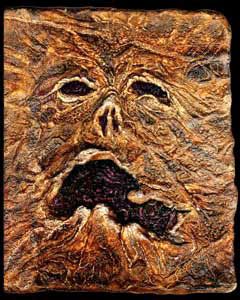 I pretty much said the magic words.
I pretty much said the magic words.
AncientH:
Most of this section is cribbed directly from Lovecraft's
The History of the Necronomicon, with a few adornments and glosses that cover uses of it after Lovecraft died. As with calling Cthulhu himself, the book has a prominence in the extended mythology which is kind of absent from the actual stories - no one in Lovecraft's fiction ever goes mad from looking through the
Necronomicon - but it's one of those things people tend to latch onto.
 I have no idea why this Necronomicon has tits...wait, yes I do.
I have no idea why this Necronomicon has tits...wait, yes I do.
FrankT:
If all that seems like two and a half pages that we didn't really need, and perhaps more specifically that it was information that should be included (or not) in the lists of books... yeah. Like the Mythos timeline and similar crap, this Necronomicon section is an essay written by Keith Herber, and it is included in its entirety as a standalone piece rather than spare any attention on the part of the editor or primary author to blend it into the main text. I bow to Ancient's
massively more detailed study of all things Necronomicon, but the typesetting nightmare that this section represents should not go overlooked. Quite simply, it doesn't fit in the book. It doesn't fit stylistically, it doesn't fit conceptually, and it's just a waste of wordcount.
This could have been two and a half pages explaining police response times in the 1920s or something, and it would be
way more helpful for actually running a game. Putting this right in the middle of the book just comes off as obsessive and insane.
AncientH:
Again, playing to the audience. It probably pays to note that this isn't your standard roleplaying game - this is, in fact, the longest-lived and most influential
licensed roleplaying game, and like all licensed games paying homage to your source material tends to trump basic considerations of realistic play...plus, we're now in the quite bizarre situation where CoC has generated far more fictional content than Lovecraft and his friends ever wrote for the Mythos proper. Funny old world.
Howard Phillips Lovecraft
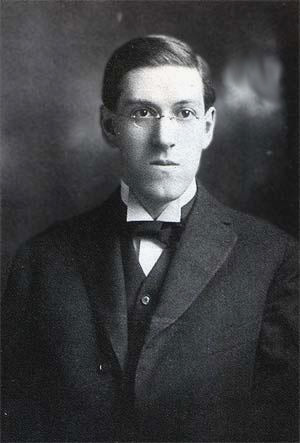 This is HP Lovecraft
This is HP Lovecraft
 This is Hulk Hogan.
This is Hulk Hogan.
 Tofu
Tofu.
FrankT:
Having a mini-biography of HP Lovecraft in the middle of Call of Cthulhu isn't
quite like putting a mini-biography of Gary Gygax in the middle of the Player's Handbook, but it's a whole lot like putting a mini-biography of Tolkien into the Monster Manual. Quite simply: there is very little reason for this essay to be here. It's an interesting
subject matter to many Call of Cthulhu
gamers, but it has no real
relevance to Call of Cthulhu
games. If you play Mythos based role playing games in the here and now, you're not actually interacting with HPL's life. Heck, both Role Playing Games and the idea of there being something called “The Cthulhu Mythos” for you to be roleplaying in were developed after HPL's death.
HPL was an incredibly influential writer, but most of his influence was not felt during his lifetime. Cthulhu is a household name
now, but it sure wasn't
then. In a very real way, this game
isn't playing in the world of HP Lovecraft, it's not even playing in the world of Lumley or Derleth – it's playing in the world that was created by the collective fanon of a couple of generations of science fiction and horror fans for whom all of those authors were considered classic literature.
So what's really important would be a discussion of perhaps ideas that HP Lovecraft had that are still scary alongside his other ideas that are not scary at all any more. Like the big reveal at the
end of Medusa's Coil is that Marceline has a little bit of African ancestry. Dun dun
DUN! In the era of having an actual Black president, the reaction of the reader is not to gasp and clutch at pearls, but more to say:
 Seriously.
Seriously.
A dry list of HPL's correspondances doesn't mean dick. The literary movement he was instrumental in starting didn't take off until after he was dead, and the important thing is how it has grown and changed since he was alive, not who he was working with at the time. Fuck.
AncientH:
Well, it's a little important. Lovecraft encouraged the development of Robert E. Howard, Clark Ashton Smith, Fritz Leiber, Robert Bloch, and C. L. Moore among others...but yeah, I have no idea why his biography is here instead of crammed into an appendix somewhere. I guess it's important to players pretty much because it's important to fans (and, in a slightly different direction, to English majors), in pointing out different writers that you can totally steal from to generate material for the game.
FrankT:
That too.
AncientH:
On the racist front...yeah, Lovecraft was prejudiced and xenophobic and adhered to some quite weird racialist and anthropological views, probably because they spoke to and supported his prejudices about black people. At this point I feel I should do the apologist thing and tell you that "On the Creation of [EDITED]" was written when he was a teenager and was never intended for publication, that his views on things like Nazis did change over the course of his life, and that he is never recorded actually speaking out or advocating violence against Jews, black people, homosexuals, etc. ...but I think you can pretty much get the gist. It was the 1920s and 1930s, and there was shit that it was okay for people to think back then which is just completely fucking abhorrent to us now, and we call that
progress. When we talk about the wrong side of history, that's the kind of thing we mean. A hundred years after the fact the only people really questioning a woman's right to vote in the America is
Ann Coulter, professional troll.
None of this which is in any way actually reflected in this particular mini-bio, but it's the kind of thing that gets brought up - not because none of your other pre-Civil Rights authors weren't racist, misogynist, or anti-LGBT, but because we published Lovecraft's letters where he actually wrote that shit down.
 This is the World Fantasy Award which, since 1975, has been cast in the image of Lovecraft. People have been kicking shit up about that lately because some of the winners are people of color and don't care for Lovecraft's racism.
In Rerum Supernatura
This is the World Fantasy Award which, since 1975, has been cast in the image of Lovecraft. People have been kicking shit up about that lately because some of the winners are people of color and don't care for Lovecraft's racism.
In Rerum Supernatura
 This picture doesn't have much to do with the section, but the section doesn't have much to do with the game, so we're even.
This picture doesn't have much to do with the section, but the section doesn't have much to do with the game, so we're even.
FrankT:
Given the fact that Ancient History explodes into nerd rage on an 11 or less when exposed to bad HP Lovecraft scholarship (a disadvantage which would net him 10 character points in a different 80s era gaming system), this section was specifically requested for him to rant about – so I'll mostly keep hands off. Just so I have something to do on this section, I'll deliver some dry background.
In Rerum Supernatura is a set of “in-character” essays written by William Hamblin under the name of his character: Phileus Sandowsky. It's six pages long, and formatted like a fake academic paper. I don't mean it's a fake academic paper, I mean it's formatted like someone who didn't know what an academic paper looks like might think a fake academic paper should look. It's very strange. It starts announcing that it is by “Herr Doktor Phileus P. Sandowsky” from a university in
Bulgaria (which importantly is and was a school in Slavic Bulgarian, not German), and ends with a “Conclusion” like it was a fucking English assignment. And everything in the middle is stupid or crazy or both.
So since I'm sure that fake scholarship masquerading as fake-real scholarship makes Ancient History check for nerd rage
twice, I'll let him take it from here...
AncientH:
You actually get a lot of these in the Cthulhu Mythos, some better than others. Part of the conceit of Lovecraft's fiction is that he never
starts out with some batshit insane abomination from the darkness beyond the stars or a college professor trying to read an incantation from a book bound in human skin as bullets hit the shoggoth with a dull "thup." He pretty much always starts off in a completely mundane and often painfully researched setting, and the events are often recounted in the form of a pseudo-document, a technique that harkens back to "The Manuscript Found in Saragossa" (1815) and whatnot, and the writers are usually intelligent - and occasionally academic - men who are striving to give a full and proper recording of what happened. It's a different style from the
noir fiction of Mickey Spillane and Dashiell Hammett, is what I'm getting at, and there are roots to it. Often, these sort of documents tie in with the elaborate literary history of the Mythos itself, blending real and fictional events into a new whole, so that the average reader doesn't know how much is true and how much is false, gradually wending its way to some completely supernatural conclusion - but being all the more exceptional for all that, because the reader is brought there by degrees instead of all at once. It's the sort of thing that is done in the manner of an elaborate hoax, and indeed, elaborate hoaxes have been played with style that have totally fooled people - there are still card catalogs at libraries with listings for the
Necronomicon of Abdul Alhazred, for example, and morons still quote Colin Wilson's introduction to
Necronomicon: the Book of Dead Names. Fuck,
I've done it.. I even accidentally trolled Wikipedia once when I
did it so well that somebody actually cited some of my make-believe sources in the article on
tentacle erotica (scroll all the way to the bottom).
But, it can also be done poorly. This section,
In Rerum Supernatura is a take-off of
De rerum natura, and is designed to be sort of an explication of some stuff in the Mythos that doesn't add up - specifically, some weirdnesses and inconsistencies in the history of Lovecraft's
Necronomicon. It's dry and quasi-academic, and it handles such old (and perpetual) questions as the meaning of "Abdul Alhazred" (which is not a real Arabic name, because Lovecraft didn't know Arabic and just liked the sound of it, and which has been puzzled over for generations even though the answer was, and always shall be, "lulz." Hell,
I have even fallen into this trap and gave a good argument why the original name should be something like Abdullah az-zahr...look, I'm doing it again, let's move on.)
Even given the stupid format and rock-hard grognard erection required to write this piece to begin with, I'm going to defend it's inclusion here on the grounds of
world building. Because it is totally an in-character document, the kind of thing you could xerox and hand to players and let them argue about. It provides real information that gamemasters might use, like different words that might refer to different Mythos entities in different real-world languages.
And that is important. Nobody really gives two tugs of a halfling's cock what the word for "orc" means in the Wood Elf dailect, and that's never going to be a major or minor factor in the plot for any generic fantasy game because in D&D every race = culture = language. You almost never get the idea that there are French Elves and German Elves, you get something like High Elves and Dark Elves, and at once you reduce and simply the cultures and languages of the different groups in your game down to a couple stereotypes and some hard game mechanics.
Well, Call of Cthulhu does it differently. It's set in something mostly analogous to the real world and a lot of their sourcebooks read like really crappy history books
but because of that you can pretty much include as much real history and real-world complexity as you stand. Sure it'll suck if you try to play racism and gender-roles straight in the 1920s, but at least that's a thing you can do without blushing when you tell somebody that their Drow Ranger has to use the service entrance at the back of the fucking High Elf restaurant.
 Scandalous!
Scandalous!
So yes, these pseudo-academic pieces appear from time to time, in part because that's the nature of the genre, and in part because they're world development. Often they're...well, pretty crap. But because they're grounded in the real world, they tend to have a verisimilitude that equivalent pieces in other RPGs lack. And there's no end of samples they can base this stuff off of.
FrankT:
We done? Good.
Mental Disorders
 This book isn't the dumbest thing you'll see about mental health this week.
This book isn't the dumbest thing you'll see about mental health this week.
AncientH:
I should mention a lot of this stuff was taken from things published after the initial edition, and then added to the core document. However, it was literally
added, not
worked in. By any proper route of organization, this should have been placed back when we were talking about rolling up your temporary/lasting insanity, but for whatever reason it isn't, it's here. That's sad.
FrankT:
Is it really “nerd rage” when it's medical in nature, and
literally life or death for millions of people? Yeah, I guess it probably is.
The author here didn't give himself very much
space to handle diseases of the mind, and obviously doesn't understand the subject very well and very likely didn't care. Basically there are four sub-sections that are written in very different tones and were probably cribbed from different sources. You get: a list of culturally specific conditions from Malaysian
Amok to Pacific Northwestern
Wendigo Syndrome – in the modern age such a list would have been “researched” on Cracked, but at the time it probably was cribbed from a pop-psych or pop-anthropology book; a list of then-modern psychiatric diagnoses which was almost certainly abridged from the DSM; a rant about substance abuse which apparently claims that LSD causes people to become homicidal, so I assume this was taken from a Reagan-era drugs pamphlet; and finally a list of the proper names of phobias, which since it includes Gephyrdrophobia (Fear of Crossing Bridges), I can only assume the source here was one of those books of stupid and obscure words.
Now obviously we're on shaky ground here. It's a game about going insane, so naturally you're going to need to write something about that topic. But gosh you'd hope that after a decade and a half of helming a game about going insane that the author would know
something about the topic. In the 90s, you mostly had games list psychiatric diagnoses until the author couldn't remember any more, which led to Fish Malks because a really disruptive condition like multiple personality disorder is a lot more memorable than something that grinds away at the patient's self esteem and health like anorexia nervosa. So I
guess that the book was trying to elevate things a bit by busting out the DSM and laying down some sciencish words. But that's just it: this isn't
scientific terminology, it's
sciencish terminology. The author properly places multiple personality disorder under “Dissociative Personality Disorder,” but if you actually read the description it's still Fish Malk bullshit:
Call of Cthulhu: Reference wrote:Players may need several or many investigator sheets for their investigator's different personalities.
God dammit!
The bottom line of course, is that very few of these diagnoses are things that people acquire by being subjected to gruesome imagery. That's psychological trauma, and it can cause or exacerbate anxiety disorders. But it's not going to give you a chemical imbalance or a brain structure anomaly. You do not
become narcoleptic because you saw a severed head. You
are narcoleptic because you have low levels of hypocretin. Indeed, since we know
why the character is going crazy (they saw, participated in, or were victimized by something horrible), we already know the fucking diagnosis. It's post traumatic stress disorder. And in the
1920s, that term hadn't been invented yet, so it would be called “shell shock” instead. Any and all discussion of other diagnoses are therefore mostly superfluous. The key would then be to determine how well the book handles the different manifestations and symptoms of traumatic stress.
Post-traumatic Stress Disorder wrote:after a traumatic event, perhaps years later, the character begins to relive the trauma through persistent thoughts, dreams, and flashbacks. Correspondingly, the character loses interest in daily activities.
Really. That's it. That's the entire description of the actual condition that your character is going to acquire. Now, leaving aside the fact that this is in reality a small sampler of the available manifestations of PTSD, I think this warrants a
bit more than 2 vague ass sentences in the whole goat fucking book. Can we have some rules up in this for intrusive thoughts, nightmares, and disruptive feelings of guilt and fear? I mean, it's supposed to be the focus of the
entire fucking game, so shouldn't it say
something? Fuck!
So that's the main narrative of the chapter: someone busted open a real book on real psychiatric disorders in order to lay down some real terminology. But it's all cargo cult, no understanding. The author didn't read deeply enough to realize that a lot of his descriptions of how things worked were bullshit (or he just didn't care), and had no idea of what the significance of any of the sentences being copied is. There is no effort to distinguish between a symptom and a disorder, and I doubt the author knows what the differences are.
But what about the other three sections? Well, they sure as fuck aren't going to win any prizes for accuracy or completeness. The list of phobias is literally just a list. It was probably copied from a book of stupid words that technically exist because you can slap Greek prefixes to Greek suffixes and make new English words whenever you want. No attempt is made to integrate any of that into the game in any way. The section on drug addiction is... puzzling. Obviously they had access to
some kind of text on drugs, but again they didn't spend any effort in contextualizing any of the information in there.
So Ketamine is in the same class as PCP. It's in the same class because they are both dissociatives and operate on similar parts of the brain. There are important
reasons that they are in the same class. But those are not important at the level that investigators would give a shit about. PCP ends with people stabbing each other and ketamine ends with people curling up on the floor whimpering about how they've lost their name and are no longer allowed to stand. From the standpoint of their effects
in a game, you'd put ketamine in with opium and PCP in with meth and crack.
The final bit (actually the first bit) is the short list of specific societal psychological problems. Those are fascinating and cool, but there isn't any information or context there.

AncientH:
Academics have had a tendency to decry the readers of Lovecraft and Tolkien as "cults," and there's a bit of truth to that. There's something of the air of religion that people can develop about Lovecraft and the Mythos, you hear words like "canon" thrown about unironically, and as we have already seen people treat the Call of Cthulhu corebook like it's a fucking Torah as far as exact transmission goes. Fan dedication by itself isn't bad for a game but...well, as you see with this portion, it has its downsides. If this were a GURPS product, the Sanity rules would have been written by or in collaboration with someone with actual degrees and experience in psychology, psychiatry, pharmopscyhology, psychopharmacology...whatever. People that know what the fuck they're talking about. Instead, we have the actually very vague term
insane thrown about, and misused and misapplied, compounded by the sad but seemingly perpetual misunderstanding of mental disease, and you get the point where people think that seeing the starspawn of Cthulhu can cause Tourette's.

So, this section is by itself one of the reasons why Call of Cthulhu seriously needs an update. I don't know if 7th edition will deliver. Indeed, I kinda fucking doubt it, and the old fans would probably declare heresy if it did. But there you go.
Next up: Keeper's Lore.

